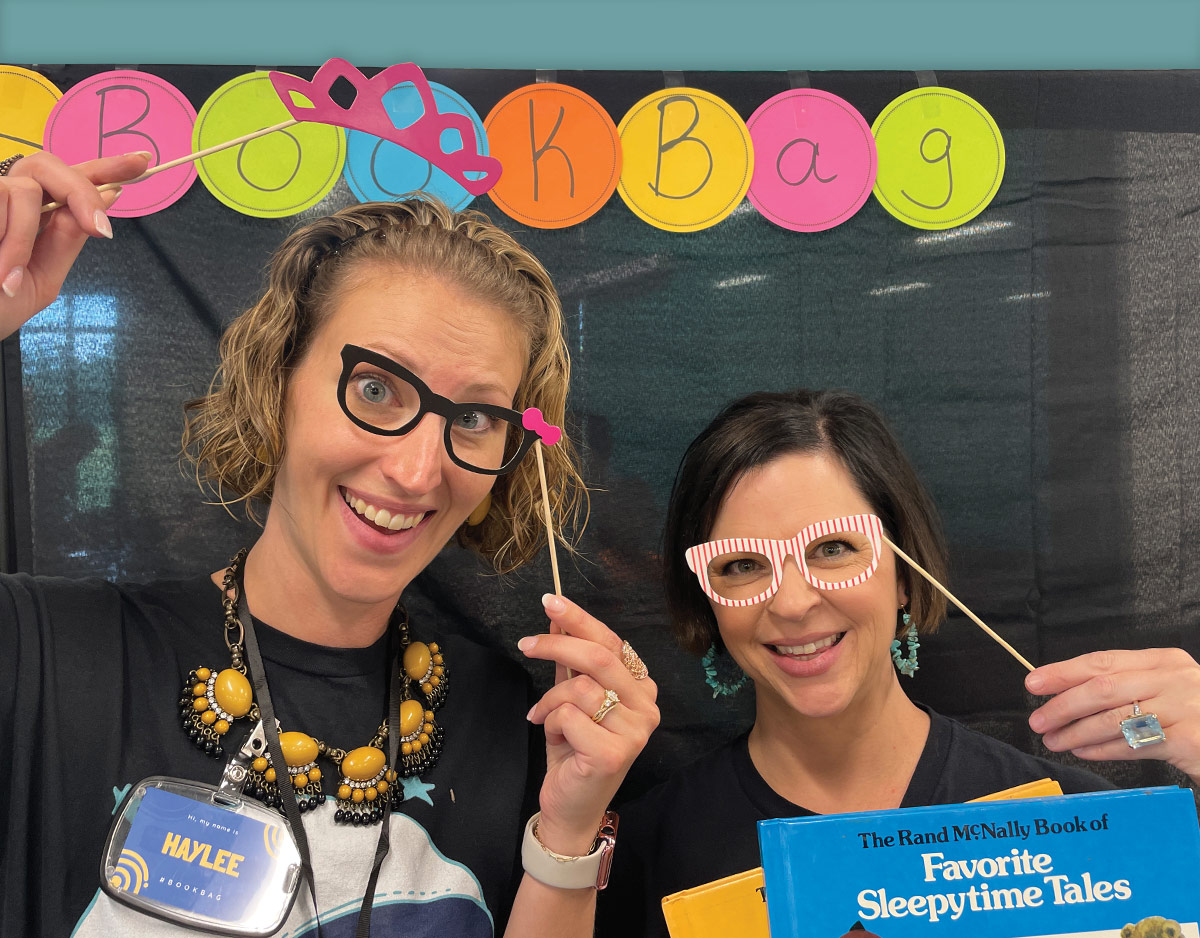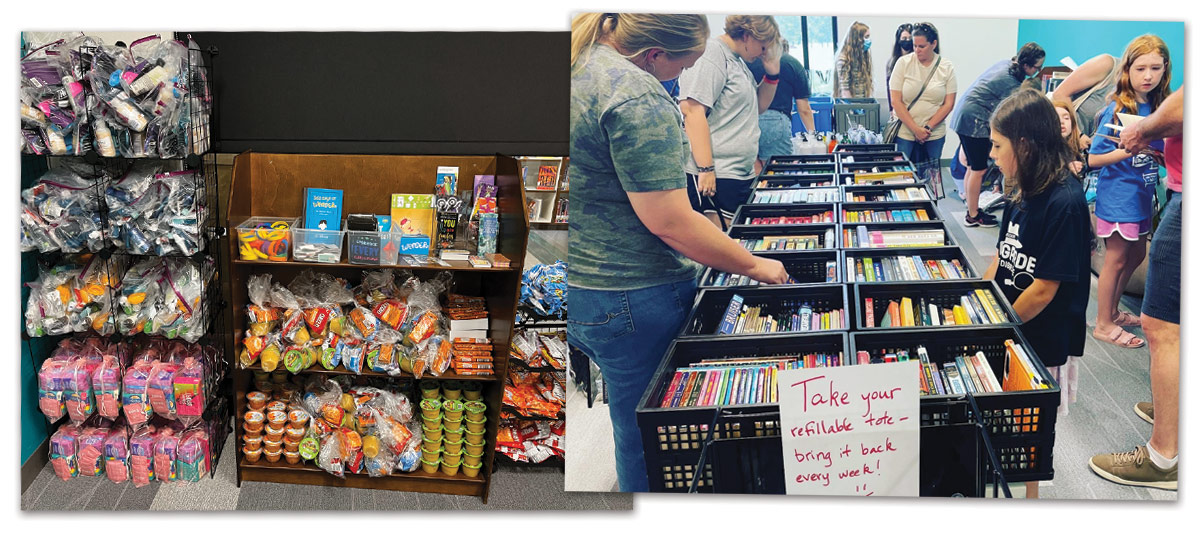A Summer Reading Program Doubles as Service for Outstanding Needs
For the past two summers, school librarian Sheila Michaels has led a program that gives out bags with books, hygiene items, and snacks—all for free.
 |
Haylee Anderson and Sheila MichaelsPhotos courtesy of Sheila Michaels |
For the last two summers, people of all ages have arrived at the Nixa (MO) Community Branch Library and filled bags with books, hygiene items, and snacks—all for free. The BookBag program is the creation of Sheila Michaels, the Nixa High School librarian who has a passion for community outreach.
In the spring of 2022, Michaels considered the books in her library that went untouched when school was out of session. And the library was not the only service that ground to a halt over summer break.
“Kids get a lot of support during the year with food and hygiene—anything that they need,” she says.
During the summer, a school counselor told her, kids often go without.
“I was floored,” Michaels says. “How did I not think of this need in our community?”
This realization sparked an idea—a summer reading program that doubled as a service for outstanding needs. Michaels shared the possible initiative with Haylee Anderson, an English teacher at the school, and the two set the plan into action.
[Also read: Field Trip Fun: Middle School Book Club Goes to the Public Library]
At first, Michaels envisioned checking out books to students, but then realized she could give away titles being weeded from the library. With enough books to start, Michaels and Anderson focused on gathering hygiene products, prepackaged food, and school supplies. Many of the items were donated by Care to Learn, an organization in southwest Missouri that provides support for children with barriers to learning. As the program grew, the team received donated books from community members to bolster their supply.
For that first summer, Michaels and Anderson spent several hundred of their own dollars. YALSA recognized the program with the Margaret A. Edwards Award for Best Literature Program for Teens, which brought a $500 grant used toward school supplies for 2023. That summer, BookBag saw about 700 visitors, and Michaels gave away 2,775 books and 350 hygiene kits, as well as an estimated $1,200 worth of school supplies.
 |
Left: supplies for the BookBag program; library patrons browse free offerings. |
Since BookBag’s inception, Michaels says one of her main concerns was to maintain the privacy and dignity of the families who attended the program. There are no sign-ups or names, no library cards required, and no limit on what people can take, no questions asked. The branding of it as a summer reading program makes it comfortable for all families to show up. People can wander in and search for books, but also take from the hygiene and snack sections as needed and without judgment.
Michaels recalls a number of regular visitors to the program who particularly impacted her, citing an instance where she helped a mother load boxes of books and take them to her car.
“She has a home library now, and she didn’t have that before,” says Michaels. “It was thrilling to be able to provide that for her.”
Another day, one of Michaels’ students came to the program and said that her mother had just lost her job. Michaels prepared a bag of snacks and other supplies for her family.
Children came with great-grandparents, parents became weekly regulars, and gratitude and repeated “thank you”s filled the air. “When you open up and you’re gracious to them, people are gracious back.”
During the first summer of the program, Michaels decided to add a school supplies giveaway. She only bought name brands—if there were crayons, they were Crayola.
“Those kids deserve what everybody else has, even if their family for whatever reason right now is struggling,” says Michaels.
The school supply giveaways, which occurred during the last two weeks of the program, were especially popular, with lines out the door and materials only lasting for about fifteen minutes on busy days.
“The number of people we were able to serve shows me that there was a need that we were able to meet,” says Michaels.
She and her growing team are coming up on their third summer of the BookBag program, which is expanding to the larger Clever Community Branch to serve Nixa and a neighboring town. Michaels has surpassed her original goals for the program, including something beyond the items that fill those bags.
“I want people to see the library as a place where your needs are met,” she says. “It doesn’t matter if you’re checking out a book or need help with voter registration, I want these kids to learn that when they need something, they can go to the library.”
How to start your own BookBag program
“The key is simplicity,” says Michaels. “It’s not complicated. It’s getting the right people together and getting the right resources together, and people will show up. You really can’t fail at giving books away to families.”
1. Assess your collection and see if there are titles you can give away. Also consider setting up a book donation collection. Often, parents are willing to give away books from when their children were younger.
2. Gather your other supplies. This includes hygiene kits with shampoo, soap, deodorant, etc; feminine hygiene products; pre-packaged snacks; and school supplies. These items can come from community donations and/or charitable organizations that help students in the area.
3. Find a central location. This will likely be somewhere in your school, local library, or community center. The materials can be set up ahead of time and updated weekly.
4. Spread the word. Advertise via social media or signs around your community and library.
5. Give away your materials! Once people are aware of the program, they will show up.
Caroline Nieto is a sophomore majoring in English at Columbia University.
RELATED
The job outlook in 2030: Librarians will be in demand
The job outlook in 2030: Librarians will be in demand
ALREADY A SUBSCRIBER? LOG IN
We are currently offering this content for free. Sign up now to activate your personal profile, where you can save articles for future viewing






Add Comment :-
Be the first reader to comment.
Comment Policy:
Comment should not be empty !!!